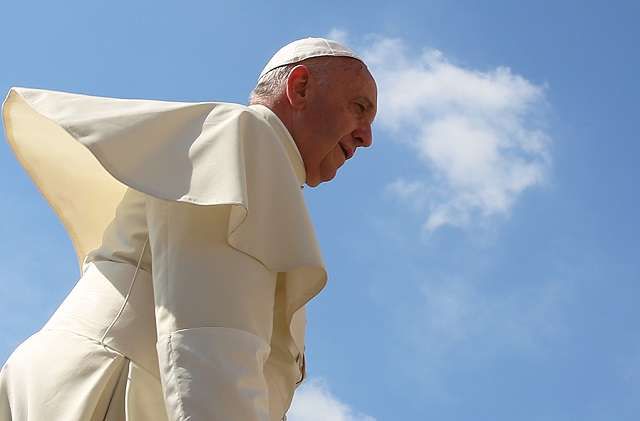Vatican City, Jun 28, 2017 / 03:57 am (CNA/EWTN News).- On Wednesday Pope Francis said that following Christ means taking a path contrary to that of the world, and being prepared to suffer because of this; though we have hope because of God’s constant presence.
“Persecution is not a contradiction to the gospel, but is part of it: if they persecuted our Master, how can we hope that we will be spared the struggle?” he said June 28. “However, in the midst of the whirlwind, the Christian must not lose hope, thinking he has been abandoned. Jesus reassures his disciples saying, ‘Even the hairs of your head are all counted.’ As much as to say that none of the sufferings of man, even the most minute and hidden, are invisible to the eyes of God.” “God sees, and surely protects; and will give his ransom.”
Pope Francis continued his catechesis on the theme of Christian hope during the weekly general audience Wednesday in St. Peter’s Square. This time he reflected on the counter-cultural life of the Christian, which will mean withstanding persecution on some level, and for some, even martyrdom.
“Christians are therefore men and women ‘against the current,’” he said. “It is normal: since the world is marked by sin, manifested in various forms of egoism and injustice, those who follow Christ walk in the opposite direction.” As Christians we do this “not for a contrary spirit, but for loyalty to the logic of the Kingdom of God, which is a logic of hope, and is translated into a way of life based on the directions of Jesus,” he continued.
“Christians must therefore always find themselves on the ‘other side,’ on the other side of the world, that chosen by God; not persecutors but persecuted; not arrogant, but gentle; not conmen, but submissive to the truth; not imposters, but honest.” The first indication of a life lived based on this logic is poverty, the Pope said.
In fact, he emphasized, “a Christian who is not humble and poor, detached from wealth and power and above all detached from himself, does not look like Jesus.”
Following this way has its difficulties and struggles, of course, the Pope said. But in difficulty, we must remember that Jesus is with us, and he never leaves his disciples alone. “This fidelity to the way of Jesus — a way of hope — unto death, will be called by the first Christians with a beautiful name: ‘martyrdom,’ meaning ‘testimony,’” he said. The early Christians could have chosen a different name for this act, like ‘heroism,’ 'abnegation,' or 'self-sacrifice,' but instead they chose this one, Francis said.
Martyrs are not selfish, living for themselves. “They do not fight to assert their own ideas, and accept that that they have to die only for loyalty to the gospel,” he said, which is the only “force” or strength the Christian uses. In his catechesis, Francis recalled that Jesus warned us that he sends us “as sheep in the midst of wolves.” And the Christian does not have weapons or claws against these wolves. He or she may need to be cautious, even shrewd at times, he said, but violent never.
A Christian travels through life with the essentials for the journey, but with a heart full of love, he said, because true defeat for the Christian isn't poverty, it's to fall into the temptation to respond to evil with evil. There is, in fact, “Someone” among us who is stronger than evil, he said.
But martyrdom is not even “the supreme ideal of Christian life,” Francis continued, because above all there is charity, that is, the love of God and of neighbor.”
Reflecting on charity, the Apostle Paul says: “If I give away everything I own, and if I hand my body over so that I may boast but do not have love, I gain nothing.”
This is why it Christians are disgusted by the idea that suicide bombers might be called “martyrs,” the Pope explained. “These do not know the martyrs — there is nothing in their end that can be brought closer to the attitudes of the children of God.”
The martyrs of yesterday and even of today had hope that no one and nothing could separate them from the love of God. So we ask that God gives us this same strength to be his witnesses, he concluded. “He gives us the opportunity to live Christian hope especially in the hidden martyrdom of doing well and with love our duties of every day.”

